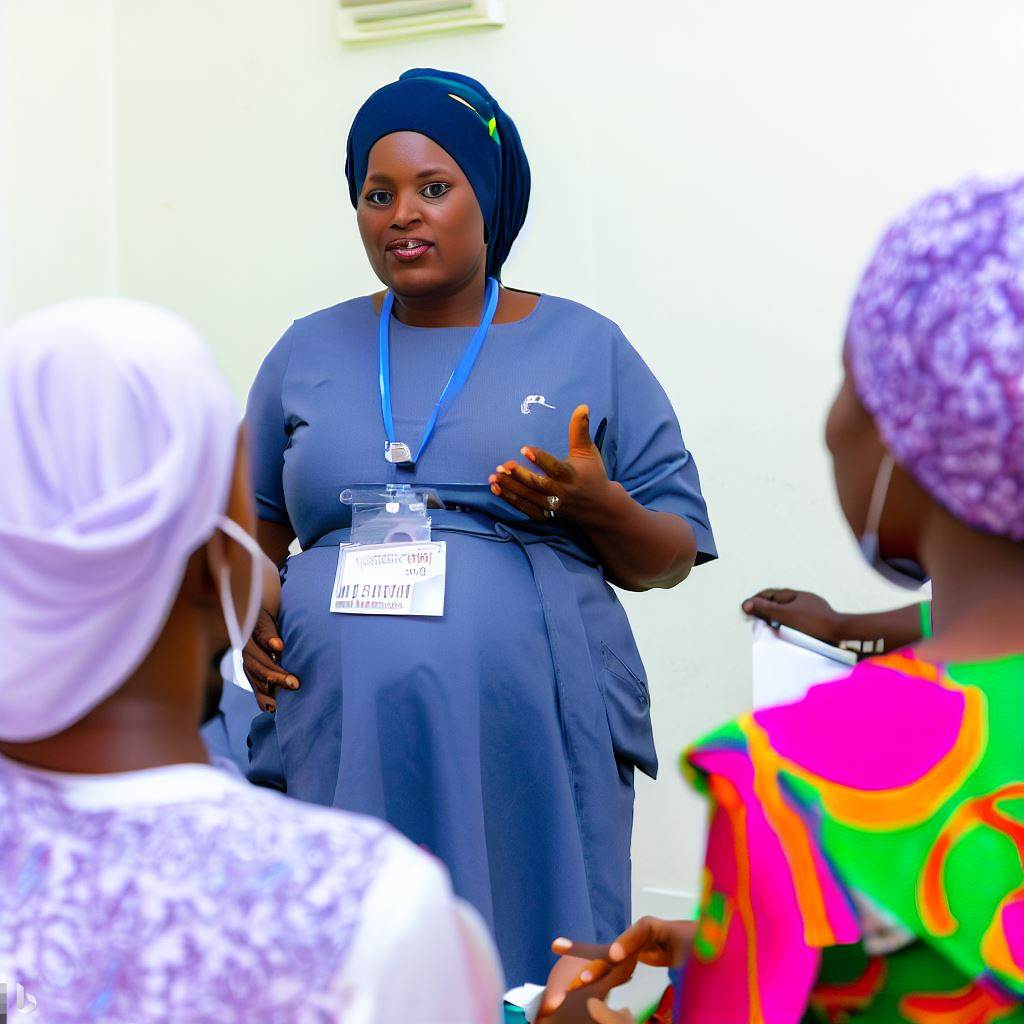Introduction
The nurse midwife profession in Nigeria has a significant history and role in healthcare. Discussing the future of nurse midwives in Nigeria is crucial for their continued importance.
Nurse midwives in Nigeria play a pivotal role in maternal and infant healthcare, combining nursing and midwifery expertise.
This blog chapter delves into the significance of exploring the evolving landscape and prospects for nurse midwives in Nigeria.
Current status of the nurse midwife profession in Nigeria
Overview of the role and responsibilities of nurse midwives
Nurse midwives in Nigeria play a crucial role in providing healthcare services to women, specifically during pregnancy, childbirth, and the postpartum period. They are trained healthcare professionals who possess the skills and knowledge to handle various aspects of maternity care.
Their responsibilities include conducting prenatal check-ups, assisting in childbirth, providing postnatal care, and educating women about reproductive health.
Number of nurse midwives in Nigeria
As of the latest data, Nigeria has a significant shortage of nurse midwives. The World Health Organization (WHO) recommends a minimum of one nurse midwife for every 175 births.
However, in Nigeria, the ratio currently stands at one nurse midwife for every 4,800 births. This shortage poses a severe challenge in ensuring quality maternal healthcare services across the country.
Current challenges faced by nurse midwives in Nigeria
Lack of adequate training and education
One of the main challenges faced by nurse midwives in Nigeria is the lack of adequate training and education. Many of them do not receive standardized and comprehensive training programs, which hinders their ability to provide quality care.
This issue needs to be addressed urgently to enhance their skills and knowledge in handling complex maternal healthcare cases.
Inadequate resources and facilities
Nurse midwives in Nigeria often face a shortage of resources and facilities, making it difficult for them to provide optimum care. Many healthcare facilities lack essential equipment, medications, and proper infrastructure, which compromises the quality of services offered.
Investment in upgrading healthcare facilities and ensuring the availability of necessary resources is crucial to improve the overall healthcare system.
Low recognition and compensation
Nurse midwives in Nigeria face a lack of recognition and appropriate compensation for their work. Despite their vital role in maternity care, they often receive low salaries and little recognition for their contributions.
As a result, many nurse midwives seek better opportunities abroad, exacerbating the shortage of healthcare professionals in the country. It is essential to address this issue by providing competitive compensation and acknowledging their significant role in healthcare.
In essence, the nurse midwife profession in Nigeria faces multiple challenges that hinder the provision of quality maternal healthcare. The shortage of nurse midwives, coupled with the lack of adequate training, resources, and recognition, contributes to the overall healthcare crisis in the country. The government and stakeholders must address challenges and invest in nurse midwife education, healthcare facilities, and compensation.
Only by doing so can Nigeria ensure a brighter future for the nurse midwife profession and maternal health outcomes in the country.
Read: Continuing Education for Nurses: Options in Nigeria
Potential developments and opportunities for nurse midwives in Nigeria
In recent years, the profession of nurse midwifery in Nigeria has witnessed significant growth, and its future looks promising.
With various potential developments and opportunities, nurse midwives in Nigeria can shape the healthcare landscape and contribute significantly to improving maternal and child health outcomes.
Increased focus and investment in healthcare
Nurse midwives in Nigeria can expect increased support from the government and healthcare sector, resulting in improved resources and opportunities.
One of the critical factors that will contribute to the advancement of the nurse midwife profession in Nigeria is increased focus and investment in healthcare.
As the government and healthcare sector prioritize improving healthcare services, nurse midwives can expect more funding, better infrastructure, and enhanced support.
This will result in improved resources and opportunities for nurse midwives to expand their scope of practice and provide more comprehensive care to women and infants.
Implementation of policies and initiatives to improve maternal and child health
New policies and initiatives aimed at enhancing maternal and child health will create more responsibilities and roles for nurse midwives.
Moreover, the implementation of policies and initiatives specifically focused on improving maternal and child health will create new avenues for nurse midwives.
These policies may include increasing the number of midwives in healthcare facilities, enhancing training programs, and ensuring comprehensive prenatal and postnatal care for women.
Nurse midwives will play a crucial role in implementing these initiatives, taking on leadership positions, and providing specialized care to expectant mothers and newborns.
Read: The Path to Becoming a Surgeon in Nigeria
Embracing technology and telehealth in midwifery practice
Advancements in technology and the adoption of telehealth will revolutionize midwifery practice, allowing nurse midwives to provide remote care and access up-to-date information.
In the era of technology, nurse midwives in Nigeria can embrace advancements in healthcare to enhance their practice. The adoption of telehealth and mobile health technologies will allow nurse midwives to reach remote areas and provide necessary care.
Teleconsultations, remote monitoring, and access to online resources will empower nurse midwives to offer up-to-date information and interventions. Integrating technology into midwifery practice will not only improve patient outcomes but also streamline healthcare delivery and reduce healthcare disparities in underserved areas.
Collaboration with international organizations and initiatives
Partnerships with global organizations will facilitate knowledge exchange, training programs, and additional resources for nurse midwives in Nigeria.
Furthermore, nurse midwives in Nigeria can explore collaboration opportunities with international organizations and initiatives. Partnering with global healthcare organizations and non-profits can provide additional resources, training programs, and knowledge exchange.
Nurse midwives will collaborate to learn global best practices, conduct research, and advocate for national maternal and child health policies.
Basically, the future of the nurse midwife profession in Nigeria holds immense potential for growth and development. Nurse midwives in Nigeria will shape their future through increased focus on healthcare, investing more, and implementing policies for maternal and child health. They will also embrace technology and collaborate with international organizations.
By seizing these opportunities, nurse midwives can make a significant contribution to reducing maternal and infant mortality rates and creating a healthier future for all Nigerians.
Read: Top Universities for Nurse Midwife Studies in Nigeria
Potential impact of the future of nurse midwives in Nigeria
Improved access to quality maternal and child healthcare services
Nurse midwives play a crucial role in providing healthcare services to expectant mothers and their children.
With the future of the profession, there is a potential for improved access to quality maternal and child healthcare services. Nurse midwives have the knowledge and skills to provide comprehensive care to women during pregnancy, childbirth, and the postpartum period.
By expanding the number of nurse midwives in Nigeria, more women will have access to these essential services This improved access can lead to early detection and management of complications, reducing the risk of adverse outcomes for both mothers and their babies.
Every woman deserves the opportunity to receive quality healthcare during this critical time.
Decreased maternal and infant mortality rates
Maternal and infant mortality rates are significant challenges in Nigeria. By investing in the future of nurse midwives, there is an opportunity to make a substantial impact in reducing these rates.
Nurse midwives are trained to handle normal deliveries and provide emergency care when necessary.
By increasing the number of qualified midwives in Nigeria, more women will receive skilled care during childbirth, leading to a decrease in maternal deaths.
In addition, nurse midwives are well-versed in newborn care and can provide essential support to ensure the health and well-being of newborns.
This comprehensive care can contribute to a decrease in infant mortality rates, improving the overall health outcomes for mothers and babies.
Empowerment and professional growth for nurse midwives
The future of the nurse midwife profession in Nigeria also holds great potential for the empowerment and professional growth of nurse midwives themselves.
With the implementation of policies and strategies that prioritize the development and recognition of nurse midwives, these healthcare professionals can gain more authority, autonomy, and influence in their field. This empowerment can lead to increased job satisfaction and motivation among nurse midwives, ultimately benefiting the quality of care they provide to their patients.
It also opens up opportunities for leadership roles and career advancement within the healthcare system.
Contributions to sustainable development goals in healthcare
The future of nurse midwives in Nigeria aligns with the country’s commitment to achieving sustainable development goals in healthcare. Expanding the profession in Nigeria will drive progress: reduce maternal/infant mortality, promote gender equality in healthcare, ensure sexual/reproductive healthcare access.
Nurse midwives, with their unique skillset and expertise, can contribute to achieving these goals by providing high-quality, culturally sensitive, and evidence-based care to women and their families.
Furthermore, nurse midwives can act as advocates for policy changes and improvements in the healthcare system to address the identified gaps and challenges.
In fact, the future of nurse midwives in Nigeria holds immense potential to bring about positive changes in healthcare. Through improved access to quality maternal and child healthcare services, decreased maternal and infant mortality rates, empowerment and professional growth for nurse midwives, as well as contributions to sustainable development goals, nurse midwives can play a crucial role in shaping the future of healthcare in Nigeria.
Read: Exploring Job Opportunities for Nurses in Nigeria

Steps to enhance the future of nurse midwives in Nigeria
Strengthening midwifery education and training programs
Nigeria needs to invest in comprehensive and standardized midwifery education programs to ensure that nurse midwives are equipped with the necessary skills and knowledge.
Strengthening midwifery education and training programs is a fundamental step towards enhancing the future of nurse midwives in Nigeria.
The provision of comprehensive and standardized education is crucial to equip nurse midwives with the skills and knowledge necessary to provide high-quality care during childbirth and the postpartum period.
Nigeria should invest in updating the curriculum and incorporating evidence-based practices to ensure that nurse midwives are up-to-date with current best practices in maternal and child healthcare.
Additionally, enhancing the clinical training opportunities for midwifery students will improve their practical skills and confidence in providing care.
Advocacy for policy reforms and supportive regulations
There is a need to advocate for policies that support and empower nurse midwives, such as improved working conditions, fair remuneration, and legal protection.
Advocacy for policy reforms and supportive regulations is also crucial to the future of nurse midwives in Nigeria.
There is a need to push for policies that prioritize the rights and safety of nurse midwives, such as improved working conditions, fair remuneration, and legal protection against malpractice claims. These reforms will enhance the job satisfaction and retention rates among nurse midwives, which ultimately contributes to better healthcare outcomes.
Read: Occupational Therapy Schools: Where to Study in Nigeria
Increased collaboration and partnerships within the healthcare sector
Collaboration between nurse midwives and other healthcare professionals will lead to more comprehensive and holistic care for women and newborns.
Furthermore, increased collaboration and partnerships within the healthcare sector are vital. Nurse midwives should be encouraged to work alongside other healthcare professionals, including obstetricians, pediatricians, and public health officials, to provide comprehensive and holistic care.
Collaborative efforts will ensure that women and newborns receive the best possible care and improve health outcomes across the country.
Recognition and appreciation for the contribution of nurse midwives
It is essential to value and appreciate the crucial role nurse midwives play in improving maternal and child healthcare outcomes in Nigeria.
Finally, the recognition and appreciation of the contribution of nurse midwives are critical for their future.
Public awareness campaigns and initiatives should be implemented to highlight the importance of nurse midwives in improving maternal and child healthcare. Recognizing their efforts and providing opportunities for career advancement and professional development will enhance job satisfaction and motivate nurse midwives to continue providing their valuable services.
In general, enhancing the future of nurse midwives in Nigeria requires a multi-faceted approach. Prioritize strengthening midwifery education, advocating policy reforms, increasing collaboration, and recognizing nurse midwives’ invaluable contributions. These steps improve maternal and child healthcare outcomes in Nigeria.
Read: Trends in Nigerian Nursing: Technological Advances
See Related Content: Orthotist and Prosthetist Training: Nigeria’s Pathway
Conclusion
Nurse midwives in Nigeria play a crucial role in improving maternal and child health. It is essential for stakeholders to support and invest in the future of nurse midwives.
Nurse midwives in Nigeria are encouraged to continue their vital work in this field.
By expanding the number of nurse midwives in Nigeria, more women will have access to these essential services This improved access can lead to early detection and management of complications, reducing the risk of adverse outcomes for both mothers and their babies.
In fact, the future of nurse midwives in Nigeria holds immense potential to bring about positive changes in healthcare. Through improved access to quality maternal and child healthcare services, decreased maternal and infant mortality rates, empowerment and professional growth for nurse midwives, as well as contributions to sustainable development goals, nurse midwives can play a crucial role in shaping the future of healthcare in Nigeria.




